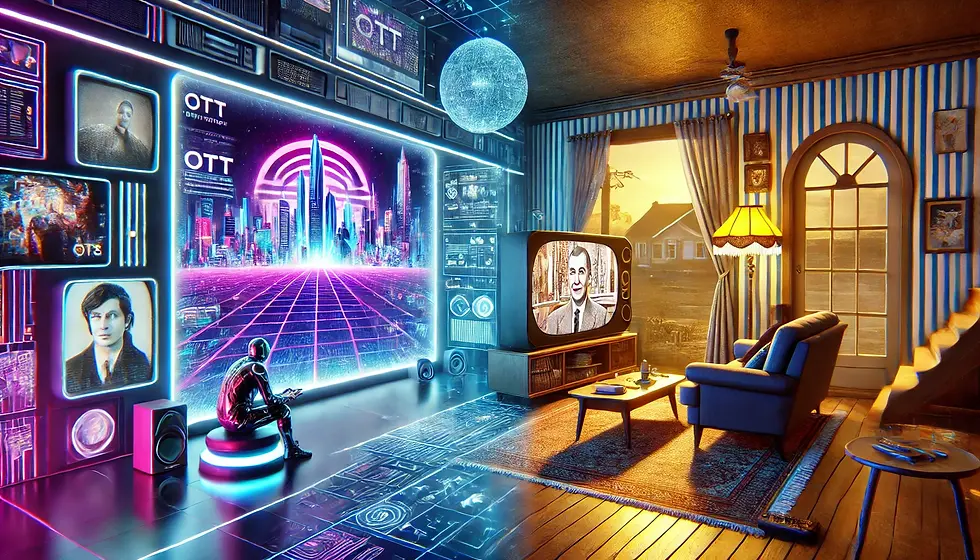Are Web Series Saturation Destroying Web Series? Let’s Talk About It
- manav verma

- Aug 26, 2022
- 3 min read
Updated: Feb 12
You know that feeling when you’re halfway through a new Web Series Saturation and suddenly think, Wait, haven’t I seen this before? The quirky best friend, the anti-hero with a tragic backstory, the plot twist you could spot from a mile away—it all feels… familiar. If you’ve binged even a handful of shows lately, you’ve probably noticed a pattern. Web series, once hailed as the fresh, boundary-pushing alternative to traditional TV, are starting to blur into a sea of sameness. But here’s the kicker: Is this formulaic approach
harming the very thing that made web series special in the first place? Let’s dig in.
The Copy-Paste Dilemma: Why Everything Feels the Same
Let’s face it—we’re creatures of habit. When something works, we stick to it. Netflix drops a Web Series Saturation hit like Stranger Things, and suddenly every platform wants its own nostalgic, supernatural teen drama. Amazon Prime nails a gritty anti-hero story, and boom, ten imitations pop up. The problem? This “safe bet” mindset is turning creativity into a factory line.
Sure, there’s comfort in knowing what to expect. But when every show follows the same beats—meet-cute, conflict, redemption—it’s like eating the same meal every day. Eventually, you crave something different. Remember when Fleabag broke the fourth wall and made us laugh, cringe, and cry all at once? Or how Squid Game flipped the script on survival dramas? Those moments stick because they dared to defy the formula.
So why aren’t more creators taking risks? Blame the algorithm. Platforms prioritize engagement metrics over originality, pushing creators to replicate what’s already trending. The result? A growing pile of “content” that feels less like art and more like content-ification.

The Good, the Bad, and the “Meh” of Web Series Saturation
Let’s not throw the baby out with the bathwater, though. Web series have democratized storytelling. Indie creators who’d never get a shot in Hollywood can now share their voices globally. Shows like Everything’s Gonna Be Okay or Brown Girls prove that fresh perspectives can thrive. Plus, shorter formats mean tighter storytelling—no filler episodes, just punchy narratives that respect our time.
But (and there’s always a “but”), the sheer volume of shows has led to oversaturation. For every gem, there are a dozen forgettable clones. Worse, the pressure to churn out episodes quickly can sacrifice quality. Ever watched a series that starts strong but fizzles by season two? Yeah, we’ve all been there.
And let’s talk about diversity—or the illusion of it. While web series boasts more representation than traditional TV, too many shows still tokenize characters or reduce cultures to stereotypes. It’s progress, but hollow progress.
Can Web Series Saturation Outshine TV and Movies? Depends Who You Ask
Here’s the million-dollar question: Will web series ever dethrone TV and film? On one hand, they’re flexible, accessible, and cheaper to produce. You don’t need a prime-time slot or a blockbuster budget—just a solid idea and a camera. Platforms like YouTube and Vimeo have launched careers (looking at you, Broad City and High Maintenance).
But longevity is a hurdle. Unlike Friends or The Office, which stay relevant decades later, most web series fade fast. Why? They’re designed for quick consumption, not timelessness. Plus, the lack of gatekeepers means anyone can make a series—which is both a blessing and a curse.
The Future: Will Originality Survive?
Let’s get real: The web series boom isn’t slowing down. According to recent data, streaming platforms will invest over $20 billion in original content this year alone. But here’s the twist—audiences are getting savvier. We’re starting to crave substance over sameness. Look at the rise of niche genres (hello, K-dramas and Nordic noir) or interactive series like Bandersnatch. People want stories that surprise them.
The solution of Web Series Saturation? Balance. Platforms need to bet on bold ideas, not just safe clones. Creators must push boundaries without pandering. And viewers? We’ve got to support the weird, the risky, and the unapologetically unique.
Final Take: It’s Up to Us
So, are web series destroying themselves? Maybe. But they’re also evolving. The medium isn’t the problem—it’s how we use it. Formulaic shows might dominate now but remember: Trends fade. What lasts is authenticity.
Next time you click “play,” ask yourself: Am I here for comfort food, or do I want a feast? Because the future of web series isn’t just in the hands of creators—it’s in ours too. Let’s choose wisely.



Comments